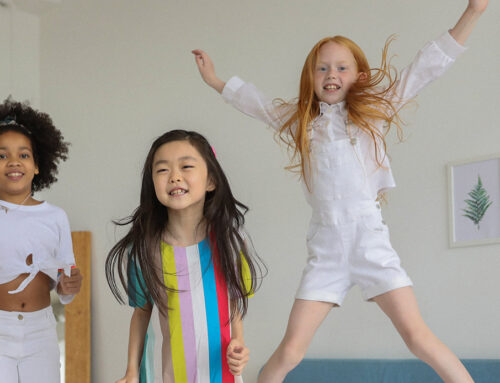Why Does My Child Get Too Excited During Play?


Picture this: you bring your 5-year-old to a birthday party, and, within 5 minutes, your previously calm angel has turned into a whirling tornado. They’re ignoring directions, bumping into people, and screaming at a pitch you’ve never even heard. Maybe your child’s teacher has mentioned they struggle with group time and free play, but this is the first time you’ve actually seen it. At home, your child has their moments, but they’re generally pretty calm, cool, and collected. They can sit for 20 minutes solving a puzzle or play legos for hours on end- so what the heck is going on?
The reason sensory processing issues often go unnoticed until children attend school is because they’re so heavily impacted by the environment. When your child is at home, they have some level of control over the input they’re exposed to. Lights too bright? Turn them off. Hate the sound of the vacuum? Go into a different room. Feeling like your body needs to move? Take a few laps around the downstairs family room. Once a child leaves home, they’re thrust into a busy, multi-sensory environment where they have no control. Suddenly, their bodies are at the mercy of the world, and their sensory system may not respond appropriately.
Sensory modulation is a huge component of sensory integration. Essentially, it means- can the body take in information and generate an appropriate response? In the scenario above, the answer is no. Your child has walked into a birthday party full of moving bodies, loud music, and all kinds of sounds. Their sensory system is overwhelmed, and their behaviors are now disorganized, loud, and out-of-control. So what can you do?
Every occupational therapist will tell you that each child’s body responds to input differently. For this reason, it’s beneficial to be seen by an OT specializing in sensory integration who can assess each of your child’s sensory systems. However, there are a few activities and tips that can help your child manage these overwhelming moments:
- Discuss things ahead of time– Talk to your child about the situation you’re walking into. Maybe come up with a plan- ask your child “How can I help you if your body gets too fast?” Children can be surprisingly adept at knowing what they need.
- Use visuals– Many kids lose the ability to process language when their body is moving too quickly. Make a visual schedule, print out a “stop” sign, write simple one-word commands on pieces of paper- then let these do the talking instead of your actual voice.
- Gather some sensory tools– Pay attention to what helps your child calm down. Try blowing bubbles, giving a big bear hug, or doing yoga poses until your child calms down.
- Leave the environment– When all else fails, take a break and get out of there! Your child may become more upset initially, but it can be nearly impossible to calm down when they’re still in the middle of the chaos.
- Play starting/stopping games– This will help the brain learn how to modulate input. Play “Red Light, Green Light,” freeze dance, and freeze tag!
- Be patient– A combination of therapy and development will help your child. Hang in there!

Eyas Landing is a therapy clinic with a mission to provide evidence-based and family-centered therapy services for children, adolescents, and their families. The primary goal is to deliver relationship-based interventions within the most natural environments and to empower families to reach their full potential. To achieve this goal, our highly educated, compassionate staff dedicates time and expertise to create experiences that maximize therapeutic outcomes. The strength, determination, and perseverance of our clients are evident as they succeed in therapy, and ultimately in their daily lives.
Eyas Landing offers a wide range of comprehensive services including Speech Therapy, Occupational Therapy, Physical Therapy, ABA Therapy, Social Work, Family Therapy, and Neuropsych testing. Services are provided throughout the Chicagoland area via Telehealth, In-Home, and in our state of the art clinic.
Want to learn more or you have a specific question? Feel free to connect with us here!


